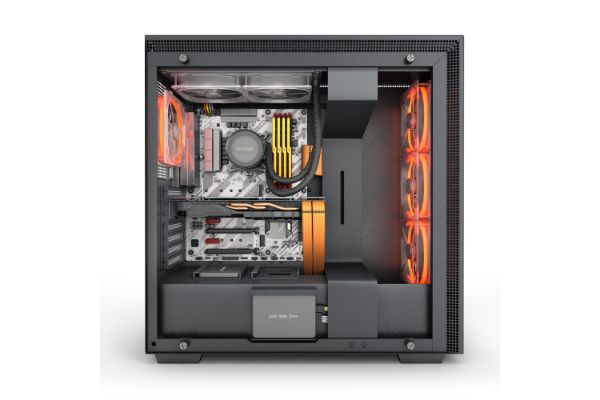Disclaimer: This post may contain affiliate links, meaning we get a small commission if you make a purchase through our links, at no cost to you. For more information, please visit our Disclaimer Page.
A PC case is an important part of the overall desktop setup. The case is what some might refer to as the “tower” of the computer, and it is the box that houses all of the important components that help the device do its job, in addition to being the place where you’ll turn it on or off, insert discs, and more.
Aside from helping to keep the components together and away from any dust and debris that might cause some unwanted issues, most PC cases are also designed with aesthetics in mind. They are a way to help your desktop computer look good, and many users like to modify them to show off their tastes or personal preferences.
Some people wonder whether PC cases are magnetic, or they’re concerned that the use of magnets near the case could cause harm to the components. We’ll address these topics and more in the article below.
Table of Contents
Are PC Cases Magnetic?
Any computer that you purchase from a tech retailer of some kind is going to have its components housed in a case or tower already. This is to help protect the PC and its parts during setup, and it makes the whole process go quickly for most people.
You can find an ideal spot for your desktop, plug a few things in, allow necessary installations, and you’ll be ready to go. Because of this, it’s easy not to think too much about the overall properties of the computer case itself. This isn’t usually a problem, but it’s good to know a few things about how to handle and care for the thing that protects your computer.
Most commercial computer cases that you get as part of your setup when you buy a PC are probably made of metal, thus, many of them can be magnetic.
If you’re wondering why PC cases can take on magnets that might otherwise do something to more sensitive electronic components, it is usually a matter of industry standards and cost.
A computer case needs to be able to conduct heat efficiently in order to allow for good airflow, taking heat away from components as they get hot from use, and help to keep the computer safe overall while you are using it. They also tend to be cost-effective options as far as casing materials go.
That said, some hobbyists may choose to make their own cases out of different materials, or you might be able to buy aftermarket or custom cases in the material of your choice. However, these other materials might be costly and heavier, which are factors to consider before making your choice. Sometimes, you might find standard cases made from plastic components.
If you do, it may be because there is some conductive paint or small shielding material on the inside of the case that are designed to add more protection to high-speed parts that do a lot of work when the PC is in use.
In these cases, having a slightly less conductive material is offset by extra shields inside. However, most PC cases you find through the usual channels should have some magnetic conductivity.
Can I Put Magnets on My PC Case? Or Inside the Case?
Some people like to put magnetic things up in their workspace as part of their decorations or to show off their personalities. With a PC case being a mostly bare tower that is just sitting there, it is natural to wonder whether it is okay to attach a few magnets to it in order to personalize it.
The best answer we can give to this question is that yes, for the most part, it should be okay to put magnets on your PC case. All of this is within reason, and there are a couple of unlikely caveats that you should watch out for, too.
For this section, we should make it clear that we’re dealing with small, everyday magnets that you might find on a refrigerator or other magnetic appliance. These are some of the most common types of magnets that you’ll see for any home or office, and they are also some of the ones that have decorations or patterns people like to use.
Therefore, these smaller magnets are the typical kind most people will probably use when it comes to sticking things on the sides of their PC cases. We make this distinction here because there are some powerful magnets that could, in theory, damage some of the components inside your computer.
However, most of the magnets that you’ll encounter for everyday purposes can’t do this. These magnets tend to have a very small range, and this range translates into small “pulling” power when measured against the distance it is from most components in your computer.
Because their range is limited, your average magnet does not have enough strength to create the kind of field that would be necessary to cause most problems for your parts when you stick it on the case.
The same principles mostly hold true for putting magnets directly inside the casing itself. Most of the magnets you’re going to be dealing with are too small to make any big differences here.
However, it isn’t necessarily a good idea to stick magnets just anywhere inside the case. While things should be fine in theory, it is possible that any magnets that are too close to the drive could cause some issues. If you do plan to use magnets inside the case for any reason, it is best to attach them as far away from other components or cables as you possibly can.
There may not be many reasons to deal with magnets inside the case itself. However, some users who are familiar with magnetic tape might want to use it as a way to attach hubs or other things and stabilize them inside the case.
In such cases, they are working with tape that has only a weak magnetic field and should be fine to use inside the tower. For added safety, anyone using such tape might wish to attach it as far away as possible from cords and components.
Are Computer Parts Magnetic?
We’ve talked about magnets in such a way that they might seem risky for computers. While it is true that using magnets not designed for PCs can cause some problems, some computer parts have magnetic properties, too. Sometimes, magnets or magnetic fields are essential to how some of the parts inside or around your desktop operate.
For example, a standard hard drive uses magnetic coating as a way to store and read the data that goes through a computer. The surface of the disk drive works with a coating that contains many tiny magnets that conduct a field. This drive also has a head that is electromagnetic, and the properties of the head play a vital role in both data storage and its retrieval.
Further, the motors on cooling fans use magnets in conjunction with electrical pulses in order to get the motion they need to spin and keep things cool.
Without fans like these, the hardworking parts of a PC would heat up too much and too fast, and this could lead to shutdowns or catastrophic failures of a computer.
Despite some of the dangers of very strong magnets that should not be near a computer, these things also play vital roles in the proper function of a PC.
Can Magnets Damage PC Components?
Yes and no. As we mentioned earlier, most of the magnets you’ll be working with that aren’t part of the computer already are also not strong enough to do any damage to a PC’s components.
Remember, this assumes that we’re talking about everyday magnets with relatively weak fields, and it takes into consideration that you won’t be putting magnets too near to sensitive parts.
With all of this in mind, it is unlikely that these magnets could hurt a computer. If a magnet with a very strong field is placed too near a drive or other electronics, then damage could occur, however.
A big part of the protection from magnetic forces that computers can enjoy comes from the nature of metal cases or towers themselves. A metal PC case has a higher level of permeability than the relatively weak magnets you might stick to the sides of the tower.
This means that the fields created by the small magnets that you stick onto a case should be stopped from moving outward by the metal of the container itself.
While all PC users should rely on common sense and their own preferences when it comes to magnets, it is also important to remember that the properties of most magnets are such that they cannot seriously endanger a computer that is set up with the proper parts and materials.
Don’t place extremely powerful magnets on or near the computer, and there is relatively little risk of any problems happening.
Conclusion
Computers are full of electronic components that need to be kept cool and that might have sensitivities to very strong magnetic fields. However, computer cases are designed to help shield the parts from this and many other things that might do them harm if they were exposed.
Most magnets people might use in their everyday tasks are simply too small and weak to pose a major threat to the health of a PC’s interior parts.
As always, it is good to know about the properties of any magnets you might be working with, and you should use your best judgment when deciding which magnets to allow near, on, or inside your computer case.


